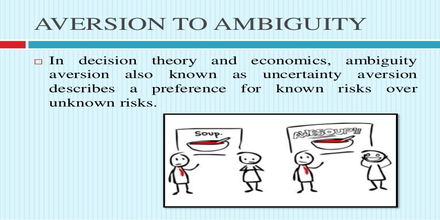Ambiguity aversion or uncertainty aversion is a preference for acknowledged risks over unfamiliar risks. An ambiguity averse individual would prefer to choose an alternative the location where the probability distribution from the outcomes is acknowledged over one the location where the probabilities are unfamiliar. This behavior is introduced through the particular Ellsberg paradox (people would rather bet on end result of an urn along with 50 red and 50 blue balls to during one with 100 total balls but for which the volume of blue or red balls is unknown).
Ambiguity Aversion
















